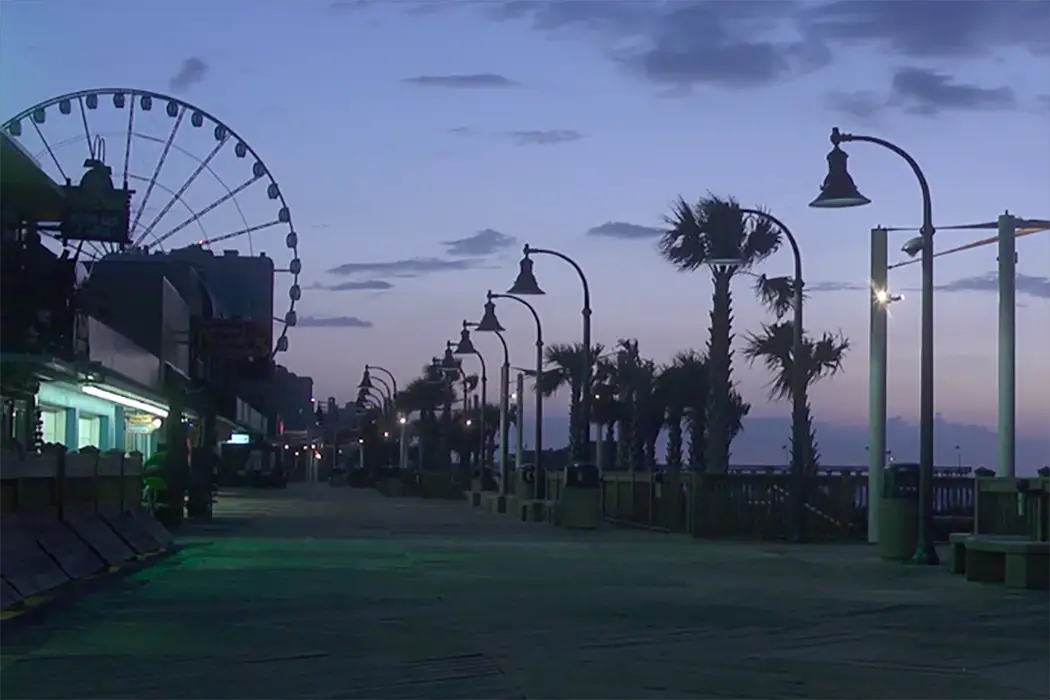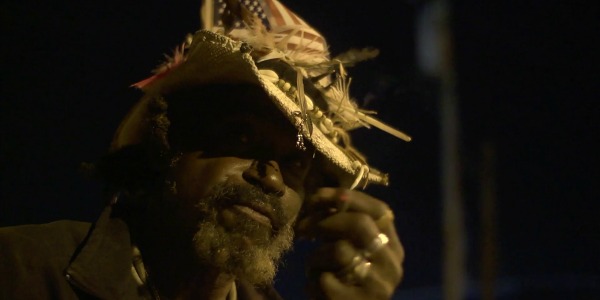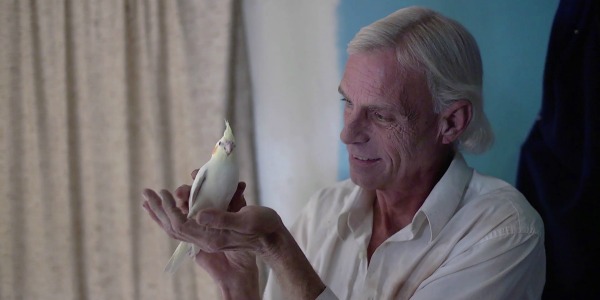MYRTLE BEACH: We’ve Done This Dance Before, But It’s A Dance I Enjoy

Arlin is an all-around film person in Oakland, CA. He…
One of the narratives being bandied about in the wake of last year’s catastrophic election is that “liberal elites” are living in hermetically sealed ivory towers, deaf to the concerns of “real” Americans outside the safe-space of the city. That talking point is at best problematic and at worst a straight up fallacy, but the sentiment that the political, socioeconomic, and geographic divide has noticeably deepened and that it’s a negative phenomenon is shared widely across the country.
Documentaries have been offered as a simple but ingenious solution to this problem. Billed recently as “empathy machines”, they offer a platform to the marginalized and unrepresented in a way not offered even by social media. When someone is the subject of a documentary, they are projected larger than life, and a roomful of people are forced to reckon with the reality on screen, seeing how much it jibes or doesn’t with their own subjective experience. In Myrtle Beach, first time directors Michael Fuller and Neil Rough train their lens on the downtrodden of the eponymous city, effectively conveying the headspace of the solidly red southern tourist town.
A Truer Self
Myrtle Beach begins with a cold open, following some sort of pig man meandering towards the ocean, effectively setting the tone for the rest of the film; the clash of rough humanity with natural beauty. We then move from one lonely man to the next; microbursts making up with eccentricity what they lack in context. As the series of interviews unfolds, the cumulative effect is not so much learning anything concrete about Myrtle Beach, but rather revealing a pervasive vibe about the town and its general sense of character. We are told by various subjects of a monied class in the town, but they remain unvisited; it’s clearly not the filmmakers’ intent to present a comprehensive view of Myrtle Beach.

Rather, Fuller and Rough prefer to stay enshrouded in the pervasive, ferris-wheel lit haze, grappling with those on the lower rungs of society. The Myrtle Beach of Myrtle Beach is dark, mystic and seemingly empty save for a few wandering souls. Initially a little jarring, these micro-interviews hop from man to man (the subjects are all men), giving just the vaguest impression of each. But thankfully, after maybe a half dozen we start to return to earlier subjects, as the film finds its structure. Among them are a WWII Veteran, a motel manager, and an amateur preacher, adopting the hackneyed cadence of the snake-wilding evangelist.
As the pair confront some of the less glamorous elements of Myrtle Beach, they do so with beautiful cinematography, which at times could be mistaken as having been intended for a fiction film. The recurring motif of following the subjects from behind as they navigate the town is used to convey that these men are often seen, but seldom known. Provocateur documentarian Jean Rouch, while acknowledging the effect of being filmed on a subject, believed contrary to his contemporaries that it resulted in their acting in a way more true to their authentic self. Fuller and Rough seem to be proponents of this theory, as it is through the documentary lens that we are able to transcend the reality of unknowing and begin the process of revelation, as the nameless subjects offer the kind of personal pontification that only a camera in one’s face can provide.

In undergoing that process, we are treated to some genuine and unexpected moments of the sort that can only occur when a documentarian steps back and lets the film come to them. One memorable scene has a seemingly black-out drunk man interrupting an interview to state that he’s from Montreal and has copyrights from the Library of Canada. We don’t see him again and those tidbits are never revisited, but the authenticity of the moment is why documentaries exist, and this film is full of them. The time spent with each of the subjects is relatively minimal, but the filmmakers make up for it with the potency of the lens.
Conclusion
The filmmakers billed Myrtle Beach as a contemporary, “less-whimsical” version of Vernon, Florida, Errol Morris’ sophomore effort, and considered by some a documentary classic. I think it goes without saying that building up such a comparison can only lead to disappointment, but on a surface level it’s a fair one given the rolling structures of both films. I think a more apt comparison would be with Sean Dunne‘s Florida Man, which applies the same treatment across the Sunshine State, with a focus on the less desirable men who call it their home. Just last year, Roberto Minervini‘s The Other Side took a startling and unforgettable trek across Louisiana. The fact that these parallels can be drawn shows that Myrtle Beach offers little in the way of originality, but is worthwhile for the insights it offers into the psyches of the disenfranchised.
We can’t assume how, or even if, any of these men voted in the last election, but given the demographics of Myrtle Beach and the theme of Christianity that runs through all the subjects’ stories, they can be seen as representative of the “real” Americans to which city-dwellers are unaware to the point of destruction. If some of their comments and diatribes rub the viewer the wrong way, they can still recognize and acknowledge the sincerity and the frustration inherent within them. We always have to be careful not to generalize; I don’t think anyone who watches Weiner and The Wolfpack would draw the conclusion that all New Yorkers are cinephilic recluses with an incurable sexting compulsion (then again…). But I hope that documentarians continue to make films like this that help us all to step outside ourselves and our life experiences and discover those whom we would otherwise never meet; so that we might say, at least, “I see you, and I hear you.”
How do you feel about documentaries’ ability to bridge the political divide?
Myrtle Beach is playing the SF Indie Film Festival this Sunday, Feb 12, with an encore Tuesday Feb. 14. For more info visit http://www.myrtlebeachfilm.com/
https://vimeo.com/149213335
Does content like this matter to you?
Become a Member and support film journalism. Unlock access to all of Film Inquiry`s great articles. Join a community of like-minded readers who are passionate about cinema - get access to our private members Network, give back to independent filmmakers, and more.
Arlin is an all-around film person in Oakland, CA. He received his BA in Film Studies in 2010, is a documentary distributor and filmmaker, and runs Drunken Film Fest Oakland. He rarely dreams, but the most frequent ones are the ones where it's finals and he hasn't been to class all semester. He hopes one day that the world recognizes the many values of the siesta system.













